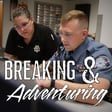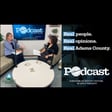Become a Creator today!Start creating today - Share your story with the world!
Start for free
00:00:00
00:00:01

Episode 7 - Becoming a Supervisor
Career growth is something every professional navigates—but in law enforcement, the path comes with unique challenges and rewards. In this episode, Sgt. Shea Haney reflects on his journey through the ranks of ACSO and how stepping into a leadership role in the Patrol Division has shaped both his career and his perspective. He shares the lessons he’s learned, the responsibilities that come with the stripes, and how becoming a supervisor has been a truly life-changing experience.
Do you have questions? We want to answer them. Send us an email to CommunityConnections@adcogov.org.
Recommended
Transcript
Introduction and Guest Introduction
00:00:24
Speaker
Welcome to Breaking and Adventuring, where we invite you into the world, the Adams County Sheriff's Office and beyond. We're going share backgrounds, stories and experiences of the men and women of the Adams County Sheriff's Office and the greater law enforcement and public safety community.
00:00:38
Speaker
but I'm your host, Sergeant Adam Sherman. And today I have with me Sergeant Shay Haney. ah We just met. So I'm just trying to get to know him.
Sergeant Shay Haney's Career Path
00:00:47
Speaker
Uh, we're going to discuss the life of a new Sergeant and what brought him to want to be a supervisor and what are some challenges, uh, he's faced so far and how to find balance and and a little more. uh, we'll, we'll get it started. So as I mentioned, we just met. Um, so it's nice to meet you.
00:01:03
Speaker
Just known you for 16 years. Yeah. Just, just kidding. Sergeant Haney and myself, we actually went through our Academy together. So he was one of the first people person people i met, uh, even involved here. And actually, don't know.
00:01:24
Speaker
Do you know what this is? yeah. It's the Academy yearbook. That's our little Academy yearbook. Let's see if we can find baby Sergeant Haney.
Starting in Law Enforcement
00:01:31
Speaker
But while I do that, Here he is. While we do that, don't we just get a little background of who you are, what brought you into law enforcement in general?
00:01:40
Speaker
All right. Yeah, thanks for having me. So I started, obviously, with you 2009, January and a Class five at our academy. Went to the jail after that for a couple of years.
00:01:53
Speaker
Spent three and a half years in the jail. Oh, look at that. I don't even think I have that book, actually. That's beautiful. That is beautiful. ah look at that little That's the first time I'm seeing that. so Thanks for sharing that.
00:02:07
Speaker
But anywho, yeah, so three and a half years in the
Special Roles and Task Force Experience
00:02:10
Speaker
jail. And then I went to patrol for a few years. Went to our community resource team for a couple of years after that. So by community resources, what did you guys do?
00:02:19
Speaker
Did you like hand out like a first aid kits and stuff? No, no. So we went to community meetings. ah We dealt with the transient issues. Okay. um Some human trafficking issues, this neighborhood, you know, quality of life issues within the county.
00:02:35
Speaker
Gotcha. So like hotspot stuff that would pop up. You guys were basically directed to yeah take those out. Yeah. So, yeah. And then other than that, we would, you know, try to find fugitives and you know, conduct traffic stops and some proactive. Nice speed. Nice. All right.
00:02:49
Speaker
After that, I went to the FBI. I was a task force officer for the ah joint terrorism task force yeah for about five years, came back to the road for a few months and spent a year and a half up in detectives.
00:03:02
Speaker
I worked property crimes, persons, crimes, financial crimes. helped out with a few critical incidents. And then yeah July of last year, I got promoted to Sergeant and I've been a patrol Sergeant ever since.
00:03:14
Speaker
Sweet. And so even going back to when you were on the joint terrorism task force, so you had dual capacities, you actually sworn in as a part of the FBI for that time, correct? Yeah. Yeah. We were, we were not U marshals technically, but yes, we were sworn in and we worked out, we worked out of the FBI's office cool as a member of, of that squad. And then,
00:03:35
Speaker
Through the sheriff's office. Awesome. And and just in, you know you can add into, but just the benefit of doing that is you're bringing, you know, the local knowledge of the you know Adams County area that you brought to the team, but obviously with the federal ah capabilities and resources, and then the dual capacity of other you know, agents and officers and deputies from other jurisdictions, you guys could then continue your investigations on a wider scale than just from a local jurisdiction aspect. Yeah, absolutely. Yeah. And I was the first um TFO to be down there from the sheriff's office. So it was a learning experience for me, but yeah, it definitely, there's and TFOs from all over different agencies. What's a TFO?
00:04:15
Speaker
A task force officer. Nice. Yes. Uh, they're, ah from all over and, uh, yeah, we work, they work cases, you know, locally and nationally. That was a good time. Nice.
Promotion to Sergeant
00:04:26
Speaker
All right. So then, you know, as you mentioned, so since July, so roughly, what are we about nine, 10 months ish about that in your current capacity. Yep.
00:04:35
Speaker
So, um, When you first got started, so way back 16 plus years ago and looking back, like, was it what you expected? Cause I know, you've got some family members that ah were also in law enforcement. So, you know, we're, was there anything as surprised when you first got, uh, deputized and, and went through your career or was it pretty much kind of what you were told and experienced Yeah, i mean, it's kind of been what i was what i told what I was told. Like you said, I have family that all worked for Denver. My dad and my three uncles all worked down in Denver.
00:05:05
Speaker
ah My nephew's the Denver Sheriff's Deputy now. um And, you know, growing up in a police family, um we, you know, they told us kind of what was going on. And, you know, I didn't talk shop with them a lot, but it definitely was kind of what I expected going through. Obviously, I worked for a different department than they did. yeah.
00:05:25
Speaker
but But yeah, no, I think it's, it's kind of what I expected. Yeah. And we're, we basically were in the Denver Metro area ish. So there's a lot of probably similarities of some things I'm sure. Um, so in, or I guess we'll go back to when you first, so you, you test, uh, for promotion.
Transitioning to Leadership
00:05:45
Speaker
So what, what was your first thought when you found out you were actually going to get promoted to a sergeant position? I don't want to work graveyards again, but I did, obviously. i had been nine and a half years. No, I um i was excited. You know, it definitely, I felt like it was time time to take that step in my career. I had been in the jail. I'd been on patrol. I'd been in detectives.
00:06:08
Speaker
I've done, you know, a lot of that kind of stuff and built up some knowledge, so I wanted to help pass that along. And so I was... I was excited, you know, and it was time my family was okay with everything. You know, I talked with my wife and everybody was ready for that step.
00:06:24
Speaker
um But, but yeah, so I was excited when I got, you know, told that I made the list and then, you know, ah when I finally got ah put on, on shift. No, and I agree. And i I benefited from the aspect of just being able to pull stuff from my own career and experiences when I became a a supervisor saying, you know, here's what I need you to do and here's why and things like that. And so, you i mean, I know with your diverse background and experiences, you're able to bring that same thing um to your shift and your deputy. So I'm sure that's been beneficial as well.
00:06:56
Speaker
Yeah, absolutely. Yeah. I mean, I didn't spend a whole lot of time as a case carrying detective, but the time that I did spend, ah spend doing that you definitely helps my new role as a Sergeant be back on the street.
00:07:08
Speaker
So speaking of that new role, so has your perspective changed at all now going from a deputy slash detective to now a frontline supervisor? Absolutely. Yeah. Yeah. I mean, you know, I don't think you realize that until you do it, the,
00:07:24
Speaker
management side of things and trying to manage your folks and the call load and everything else kind of at once. And so your, my perspective definitely has changed to, you know, um, in that aspect and then also, you know, taking care of my people, right? Like,
00:07:41
Speaker
when you're a deputy a detective you have your own assignments you have your own thing you're doing your own thing right but as a sergeant you're responsible for everybody right you need to know where they're all at what they're all doing make sure everybody has what they need so kind of having that overarching perspective on everybody um you know um definitely changed in that respect. So much broader scope for sure. Absolutely. Yeah. You know, and then you have to look at things from the agency side of stuff as well that maybe you didn't look at as a deputy or a detective, um, you know, and so that, that plays into your decision-making and your kind of day to day as well.
00:08:20
Speaker
Now, looking back, is there anything that you now realize as a sergeant that you may have taken for granted as a deputy or as a detective that you have to deal with? or Yeah. I mean, like I said, just just kind of being able to zone out a little bit.
00:08:34
Speaker
you know I mean, as cops, we're kind of on on most of the time, right? um But as a sergeant, you're just listening to everything, right? And you got to have... So there's really not a lot of time to just be like, Hey, I'm going to tune out for like 10 minutes.
00:08:48
Speaker
Yeah. My district's on lockdown. I'm good. Yeah. You really can't do that as a Sergeant. Right. And so some of that, you know, um, But yeah, no, I mean, I enjoy my new role. You know, there's pros and cons to it. so Yeah. No, I mean, it's and it's a big juggle too. I know it's easy to make fun of a sergeant, but yeah, even if you're in the office, you're doing, you know evaluations or you're setting up your schedules or approving time off or approving tons of reports. Right.
00:09:14
Speaker
All while you're still monitoring and kind of having that mental image of where your people are and what calls are on and what's what's pending, what dispatch is notifying you of. So yeah yeah, you're constantly juggling juggling and trying not to drop anything at the same time.
00:09:25
Speaker
Right. Um, so what's one thing people would be surprised to learn about just the day-to-day life of being a Sergeant, like fun, challenging, just, uh, I mean, it's fun.
00:09:37
Speaker
It definitely is. It's a good time. Right. Um, that's the good thing about being a patrol patrol in general. You don't know what calls are coming next. You don't know what the day holds, you know, call to call.
00:09:49
Speaker
Uh, I mean, like I said, it definitely is challenging. Um, especially as a new Sergeant, it's kind of, getting your grasp on everything in making sure all the boxes are checked, right? Everybody's like we talked about, everybody's got what they need.
00:10:03
Speaker
yeah All the calls are getting handled appropriately while we're trying to teach and mentor and also keep, you know, the County flowing. Um, and then keeping up with the administrative tasks on top of that, you know, it definitely takes some, some time to get in that groove as far as making that all work, work well.
00:10:23
Speaker
Um, And as a new as a new sergeant, it took a little time.
Building Trust and Team Morale
00:10:27
Speaker
And I'm still learning. I have to say I'm only at nine months in on the street. But but I have a good shift. you know We have good people that work for us.
00:10:34
Speaker
and you know And they make it a lot easier for me um but by the way they do their jobs. so Yeah, I found you know similarly where the shift I went to was a well-oiled machine, it seemed like. So I was able just to kind of sprinkle in just some of my background.
00:10:51
Speaker
But yeah, it's very cyclical to where they were taking care of me as much as I found myself taking care of them and making sure that, that you know, the shift was, was functional. and Yeah, it definitely helps when, when, you know, it works that way for sure.
00:11:04
Speaker
Yeah. And you know I walked in, I'm like, Hey guys, I haven't worked patrol in forever. So help me so I can help you. Right. Yeah. Outside of my couple months between the FBI and detectives, I had been off of a district for almost 10 years, you know? And I mean, that's, I think a lot of times too, with, with new sergeants, that's kind of a, a hurdle is coming back. Right. Cause a lot of times people will have different assignments.
00:11:30
Speaker
ah prior to getting promoted and then they get promoted and they're either usually on patrol or in the jail. And i mean, if I went, started in the jail, I hadn't been in the jail since 2013, early 2013. So it had been 12 years since I had done that job. um But, but yeah, so it takes a little,
00:11:48
Speaker
So you mentioned taking care of your team and and how they take care of you. Are there any steps that you've had to take or that you've taken to just build that trust and and morale within just your, your shift, your unit?
00:11:59
Speaker
Yeah. I mean, when I first came in, you know, i I took over the shift obviously from another Sergeant. Right. And he had his expectations and his way of doing things. um And as a new Sergeant, you know, I have my way of doing things and sometimes those don't meld.
00:12:13
Speaker
Right. And so, I kind of came in some with an expectation and got some pushback, right? It wasn't ah necessarily the smoothest start. um But over time, i worked ah from my end and worked with my guys. And I think we've got to...
00:12:31
Speaker
work through some of that, you know, and I just think sometimes taking over a new team, um, especially if sergeants are doing things, you know, maybe a little differently or have different perspectives and different point of views, it's kind of hard to get there. But as we work through it every day, we're, you know, we're working together, working through calls, we're talking through stuff.
00:12:51
Speaker
Um, you know, we've built that trust over time. Did you hit them with one of these, like just point at your stripes? No, no, I haven't yet, but Yeah, I found that doesn't work very well. Right. and Yeah. um um So how do you balance now being like a leader and a supervisor, but also a peer to people who you were deputies with and detectives with, but now you're a, you know, kind of one level up. I mean, it's there.
00:13:20
Speaker
I mean, it's weird. it's definitely What's the approach there? It's it's definitely a transition, right? um You know, guys that I've been agency with who aren't sergeants, call me sergeant i'm like i but i've known to you for 10 years you know so it's definitely a different uh different in that respect um but you know i have friendships at the sheriff's office like you do and you know we still have those conversations and i think people know when it comes to work if you know i have to be sergeant haney then i have to be sergeant haney right or
00:13:52
Speaker
And, you know, and they kind of just roll with that for the most part. um You know, it's definitely different with some folks when you get promoted, when you're going from that role of deputy or detective and in now, you know, you take that step. But, but I think it's kind of like with my shift, it just takes a little bit of time to work through that new, cause it is what
Mentorship and Case Challenges
00:14:14
Speaker
it is, right? Like,
00:14:15
Speaker
yeah You know, I'm now in a different role. I have a different kind of assignment, not a different person, but ah just kind of figuring that that out with some folks. Yeah, I think that's key too. And I found that like authenticity is huge in that.
00:14:29
Speaker
Like you're still you and you have your experiences and you're bringing those to the shift, but you're not changing who you are now that I'm, well, now I'm a Charger and so to do this. It's like, you're still authentically you, but you know, and, and, and you know, at least for me, i was, I've never changed who I am and how I treat people.
00:14:49
Speaker
And I've been able to joke and still be you know peers. Right. But then, yeah, when we're out and I'm like, no, we're doing this and here's why. Or, hey, nope, you can't have that day off.
00:15:01
Speaker
There is that that respect level and trust that's been built in to where that's it's a non-issue. so but i mean And that that takes time to develop sometimes. But I think authenticity is huge in getting that laying the groundwork. Right. And, you know, and that was kind of hard with my shift because I didn't work with a lot of them. Right. We're, we're fairly young on patrol. And so when I was on patrol, a lot the guys I was on patrol with are in detectives or, you know, are either in detectives or they're now sergeants above, you know, because at 16 years, you know, ah that we don't have a lot of 16 year patrol cops. Yeah. You got some gray in there.
00:15:34
Speaker
Yeah. it's It's expanding. So I started off with a little bit, but, um
00:15:43
Speaker
Well, we talked about the trust, so that's that's key. And I'm i'm glad you hit in on that as well. I mean, that's and that's there no matter what level you go through throughout organization.
00:15:54
Speaker
Um, well, looking back, what would you say has that been the most rewarding part of your career so far? there any like standout cases or just instances or just even now that kind of mentorship aspect that you're, you know, going to this new shift and so. Yeah, no, I mean, it's seeing these guys doing a good job every day, you know, obviously has its own rewards, you know, um, from me, from my perspective is like growth as a Sergeant, you know, dealing with some of those more complex calls, and um, you know,
00:16:23
Speaker
working through those situations. We've had a few of them since I've been a Sergeant, obviously, um, that kind of challenged me and my, and you know, skills. Uh, but I think the most rewarding thing is just seeing these guys kind of grow through their job every day and just try to help them.
00:16:38
Speaker
Right. If they call, but answer the question and try to make sure that they're setting up for success. Uh, and seeing that is, is definitely the most rewarding for me. um But yeah, the most challenging, like, you know, or, you know, from my growth is just working through some of those calls as a supervisor, you know, making sure I got perimeter set up or making sure crime scenes are taken care of and notifications are made and all of that. But, but the guys are doing the real work.
00:17:04
Speaker
um And so, like I said, seeing, seeing those guys do what they do every day is definitely most rewarding for me. Yeah. No, similarly, like my, like it was, I would kind of mark it as a little, little win.
00:17:16
Speaker
Like if we had a big call or homicide or something to where my team basically handed over to detectives, or even if there was like a district attorney that was coming to, to assist, but they were like, awesome. Like you gave us,
00:17:29
Speaker
the perfect right you know exchange or you know when you when you hand over the baton of this incident of this crime scene that they've you know it's basically right in their lap and they can just pick it up and go they don't have to go back and retrace things or there's no complaints or stuff so to me that was like ah that was really rewarding to her you know through teamwork and whatever else that we're, we're working seamlessly with these other entities within our organization or or even, you know, outside of our office as well. So, I mean, it's, and again, that's a testament to the deputies doing the work and, and, and their dedication is, it was, was huge. So it was always, you know, good high fives all around and on, on shift for that kind of stuff.
00:18:06
Speaker
Yeah, and our detective division is real great about so kind of acknowledging the work that these guys do, making sure they know you know when they do a good job, and we try to make sure that they get acknowledged for that.
00:18:18
Speaker
Nice. So now that you've been in this role for about nine, ten months, what are you most excited about as you kind of look forward to the next kind of handful of years of of being ah being a sergeant? Is there anything that you're like looking forward to or just...
00:18:31
Speaker
Yeah. I mean, just kind of growing in my spot. Right. And, and kind of learning and making sure that I'm comfortable in, in the role and just kind of the challenges, like I said, I mean, every day is different. Right. um And every day poses its own challenges, you know, I mean, I have some career goals down the line, but right now it's just kind of focused on my role here as a patrol Sergeant and just trying to learn what I can and experience as much as I can while I'm doing it.
00:18:58
Speaker
And you know, just kind of go from there. Is there anything you're nervous about? So that kind of the flip side of that. Uh, not necessarily, but I'm sorry. know. I know. No, I, uh, no, I mean, like said, just sometimes there's, there's days, right. Where there's just, it seems just kind of piles on. Right. And so, um, just kind of working through that, but I wouldn't say nervous about anything, you know, but we just don't know what tomorrow holds. Right. And so it's going to take it one, one shift at a time and, yeah you know, try to build up my team the best we can.
00:19:34
Speaker
And go from there. And especially, I mean, in in all the settings within law enforcement, but especially in like a patrol setting, like you mentioned, you know, we don't know what next call we're being called to what we're going to stumble across or contact. So there's a huge X number there of what we might potentially have to deal with. So yeah, there's just inherently some nervousness. And right I know just for me, especially as I'm you know trying to run a shift, I didn't want to do anything that would kind of hinder my team. And then again, some of those other entities that rely on what we were doing to then set them up for success. So I didn't ever want to be the reason why something didn't get, didn't get done or somebody wasn't prepared for a promotion. Cause that, that made me nervous. Cause I, I definitely looked for opportunities to you know just sit down with my peeps and just check in, how you doing? What are your goals?
00:20:18
Speaker
Right. And a huge win is when they do kind of promote out of their spots or go to, you know, I had a ah few that have now gone on the specialty units or up to detectives and things like that. Um, so for people to attempt that and maybe there's something else I could have done better that, that kind of was, I would keep in the back of my mind.
Role Duality of Sergeants
00:20:37
Speaker
Um, but I mean, that's, and that's kind of, we're in that weird sergeant is one of those weird worlds where you're still kind of on the front lines. Cause there's times where you're still going to be the first one to a call. You're still pulling over cars, but then you're also that mentor, that supervisor overseeing as everybody's doing everything too. So, um, yeah, it's definitely a dual purpose. Yeah. We wear a few hats for sure.
00:20:58
Speaker
Um, all right. So we'll transition a little bit, just kind of play like, uh, uh, you know what if game. So if, if you hadn't gotten a law enforcement, like if you're totally like, no dad and uncles, I'm not going to be like you guys.
00:21:12
Speaker
Where do you think you would have ended up? what do you What would you, what's another kind of field you think you would have been good at? I really don't have any other job skills outside of law enforcement, so I'm not entirely sure. No bow fighting skills? No, no, not been not a much of a ninja myself. ah You know, I don't know.
00:21:28
Speaker
um I mean, probably something thinking in public service somewhere. I mean, I but i should probably should have been a firefighter. quite honestly they have it pretty good um those chairs are comfy yeah yeah they got they got a pretty good setup so that probably would have been the route or you know maybe should have been the route but maybe like a professional lacrosse scout or like a yeah they probably don't make uh make too much money yeah i know you're big lacrosse guy on that that's right big fanatic yep um
00:21:59
Speaker
Do you have, i don't know, because some people do, do you have like a favorite movie or cop TV show um that you like, you know, it's kind of a, I don't know, entertaining for you?
Favorite Cop Shows and Humor
00:22:10
Speaker
as far as cop TV shows, probably the best one's Brooklyn Nine-Nine. My wife and I tried to make it through the first time, like the full season. Okay. All the seasons we hadn't yet, but we're re-watching it. ah Movie, probably. I'm i'm a superhero guy, as you probably know.
00:22:24
Speaker
ah So the the first Batman, probably. Like hy like Michael Keaton? Michael Keaton? Yes. Yep. yeah My mom actually said I watched it routinely when I was two.
00:22:34
Speaker
ah Watching it now as an adult, I don't know if that was yeah probably the best thing to watch when was two, but, you know, this is a little... It's fine. Yeah. You're going around to like your cousins, like you're my number one guy.
00:22:45
Speaker
That's right. Yeah. Apparently i danced around as the Joker when i was like a two or three year old. So, you know, it worked out. Yeah. Yeah. Not anymore. No. i Yeah. Uh, I would say I'm not, it I'm not a huge superhero guy, but yeah, those first two, ah Michael Keaton, Batman's definitely are, I think are the best ones, but Um, now Brooklyn nine, nine, how accurate is that for our law enforcement world? Would you say, I know it's a comedy. Yeah. There's some, there's some that's, you know, there's some bits of it that are, are accurate, but, uh, yeah, it's, it's a good show.
00:23:17
Speaker
It's a good show. Yeah. No, I mean, I think I try to describe it that way. I mean, like, especially on the patrol setting, but in detectives and even in the jailers, you know, there's enough downtime where hilarity doesn't sue. Right. You know, we, we like to make fun of and prank each other, but then protect each other at the same time. Right. Take care of each other. Yep.
00:23:37
Speaker
But yeah, my, like my go-to is always like Reno nine to one, where it's like, it's so funny, but like, that kind of stuff does happen. Like just a while. Absolutely. yep you know, in the middle of a call, you're laughing at your cover partner. Cause whatever.
00:23:51
Speaker
So yeah, it's all, it's all fun. All right.
Fun Rapid-Fire Questions
00:23:54
Speaker
I've got, well, we're going to a lightning round. So I'm gonna scroll to my lightning. Okay. lightning round go all
00:24:03
Speaker
So you're, you're a big superhero guy you mentioned. Yep. If you could travel into the land of Marvel, what would your superhero, your superpower be?
00:24:14
Speaker
Hmm. Probably flight. Okay. All right. So just straight up flight. Like, yeah, just, just accumulate those miles. Yeah. Okay. What else you got? You're, you're, you're also a competitive person. Cause I know back, even in the Academy days, we tried to, you know, outdo each other on different tasks stuff like that.
00:24:31
Speaker
So thinking of competitiveness, do you love winning or do you hate losing? You know, ah I probably hate losing.
00:24:43
Speaker
I wouldn't say I'm overly competitive, especially now, maybe back in the day when I was a little younger, but, uh, but I would say hate losing, but yeah, I agree. Losing it's horrible, right?
00:24:54
Speaker
Yep. I hate losing more than I love winning. All right. Let's see
00:25:01
Speaker
Spell subpoena.
00:25:07
Speaker
ah S-U-B-P-E-O-N-A. Ooh, so close. S-U-B-P-O-E-N-A.
00:25:18
Speaker
actually typed this yesterday. I shouldn't have known that. so Close. Another fun one, but I'm sure you ah you'll get this one. Methamphetamine. Methamphetamine. M-E-T-H-A-M-P-E-N-A.
00:25:32
Speaker
a m p
00:25:36
Speaker
yeah and there's some secret letters there. H E T and I lost it. That's okay. That's a, that's a toughie. Yeah. That's a toughie. I can type it out, but so my favorite was in, in our Academy is we would get, they would do occasional, uh, spelling, spelling tests and it would be those types of words, be subpoena and paraphernalia as a,
00:26:01
Speaker
My favorite one was, because and then we would also switch papers with whoever's around us and grade each other's and the tournament. I remember I got one of these and I'm grading it. I don't remember who it was for, but the word was methamphetamine. and It was literally meth, M-E-T-H, and a e a A-N-D, phetamine, F-E-T-A-M-I-N.
00:26:20
Speaker
And I'm like... I bet it was Keohan. You weren't That's probably it was. The teacher? Yes. It was Kyle Keohan probably. Hey-oh. wasn't even going to say that. No, I honestly, have no idea. Right. No, and it is funny too, just looking back.
00:26:35
Speaker
I don't know if you ever, i mean, of our class of what we had, like 26, 28 people. Yeah. You know, how how many are no longer even in law enforcement or didn't you know didn't stick around very long and just went on to other stuff and in the direction of their life?
00:26:49
Speaker
But then the trajectory of some others, because we've got you know one who's, ah I think he's now a Sergeant at an agency in the South Metro area, but you know he was on their drug task force for a while and he's done amazing things.
00:27:02
Speaker
One's a sitting Sheriff for a neighboring County. ye So I like to you know reminisce with him and occasionally when know we we see each other, but just kind of see where where people have ended up. But I think out of our initial 10, we've We're the last three. So we've got one other of our group.
00:27:19
Speaker
Yeah. Yeah. it's But everybody else has just kind of ah eventually gone their own path. Right. But I'm, I'm happy for all of them I'm happy for you. um And I know your shift is benefiting from, from your, your leadership and your knowledge that you're
Closing Remarks and Audience Interaction
00:27:32
Speaker
bringing to them. And,
00:27:33
Speaker
Can't wait to see what you do. And I hate getting phone calls from you. Cause you're right. You do get complicated stuff now. Yes. says A few times, few times. Yeah. So when I get notification from you, it's like, Oh, great. Right. What'd you guys do now?
00:27:46
Speaker
Yep. No, just yeah now keep it up. And again, I mean, the, the goal is for the community to benefit from what you guys are doing in the agency and just that continued growth. So. Congrats on that.
00:27:56
Speaker
Thanks, man. You're welcome. And then that that's another episode of Breaking and Adventuring. So we encourage you guys to just reach out to us and send us an email to communityconnections at adcogov.org with any tips, questions, things we can answer or address on the show.
00:28:12
Speaker
And feel free to follow us on any of our social media platforms for all of our amazing content.

















